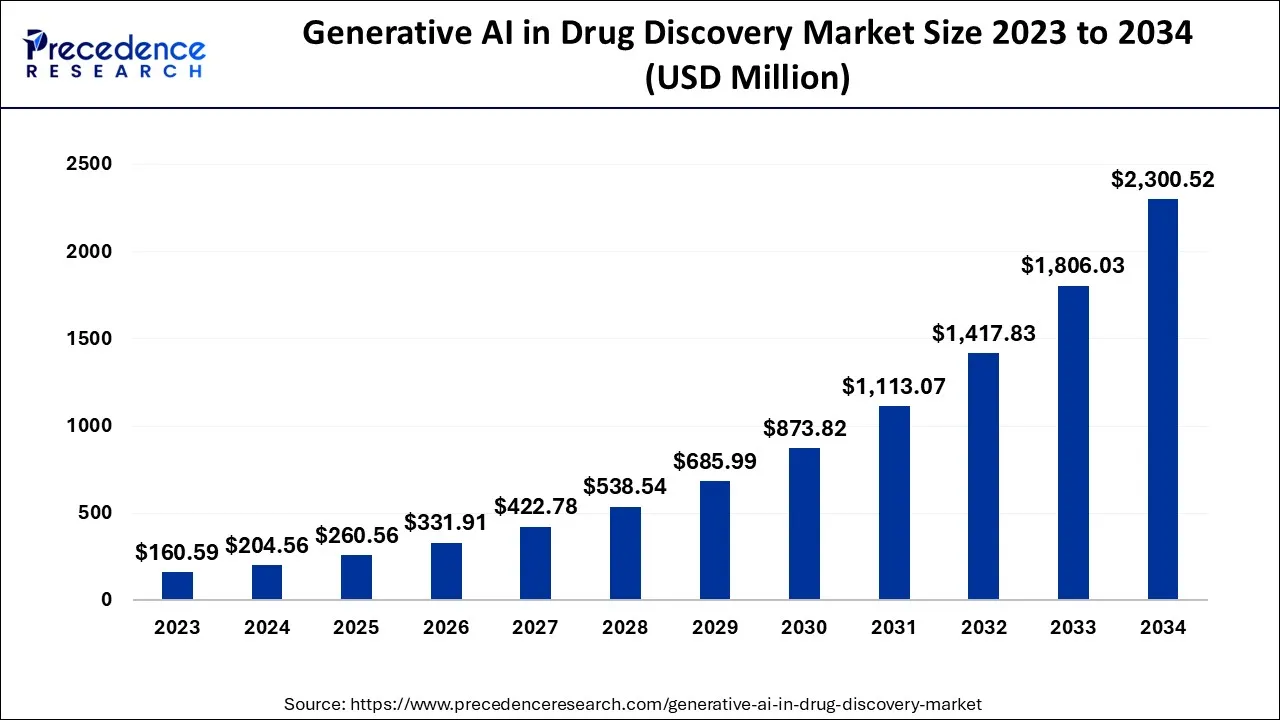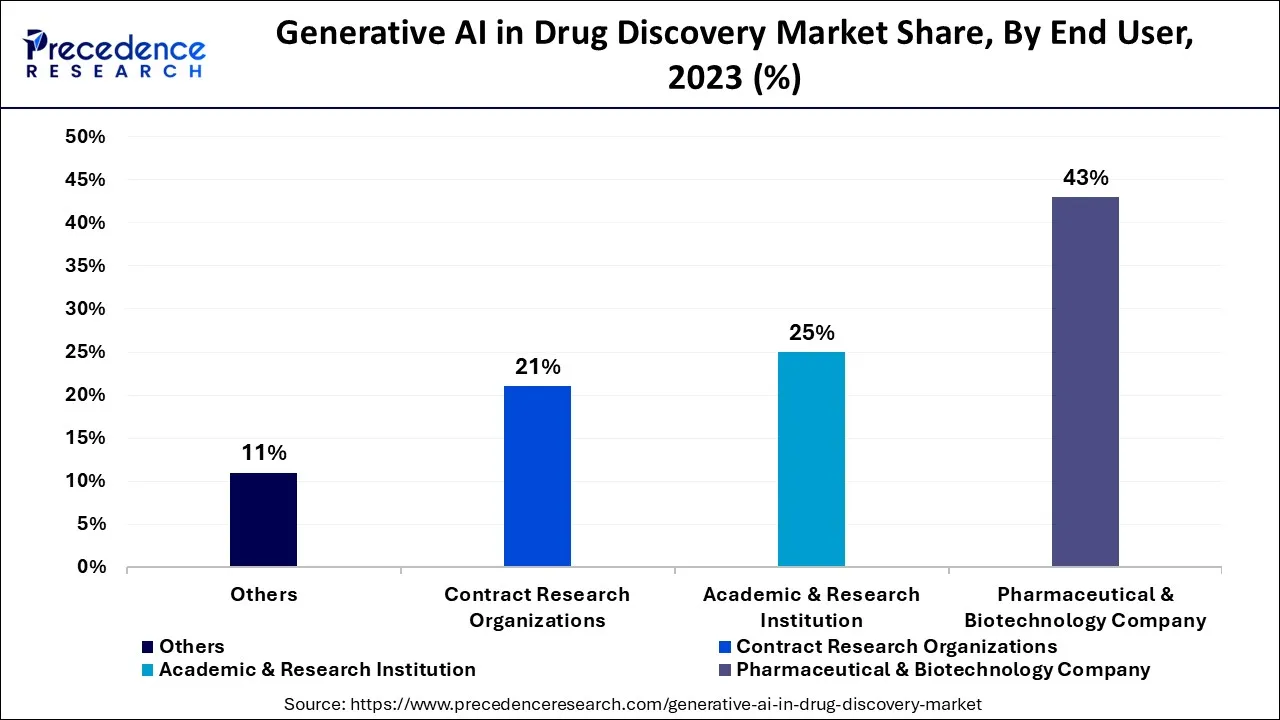January 2025
The global generative AI in drug discovery market size is calculated at USD 204.56 million in 2024, grew to USD 260.56 million in 2025, and is predicted to hit around USD 2,300.52 million by 2034, expanding at a CAGR of 27.38% between 2024 and 2034. The North America generative AI in drug discovery market size accounted for USD 102.28 million in 2024 and is anticipated to grow at the fastest CAGR of 27.51% during the forecast year.
The global generative AI in drug discovery market size is worth around USD 204.56 million in 2024 and is anticipated to reach around USD 2,300.52 million by 2034, growing at a CAGR of 27.38% over the forecast period from 2024 to 2034.

North America is expected to dominate the market over the forecast period. The growth in the region is owing to the prevalence of cancer. For instance, according to the American Cancer Society Journals, in 2022, 1,918,030 new cancer cases and 609,360 cancer deaths occurred in the United States. Moreover, the region has a well-established and thriving pharmaceutical industry and is home to numerous pharmaceutical companies, research institutions, and academic centers that are actively investing in AI technologies for drug discovery. These organizations recognize the potential of generative AI to enhance efficiency, reduce costs, and accelerate the drug discovery process. For instance, in May 2023, to use artificial intelligence (AI) for drug development, XtalPi partnered with US-based Eli Lilly. For the de novo creation and delivery of medication candidates for an unidentified target, the two businesses will leverage XtalPi's integrated robotics platform and AI capabilities.
The partnership will use an AI drug discovery tool to build a new chemical that Lilly will pursue through both clinical and commercial development. Furthermore, regulatory agencies in North America, such as the U.S. Food and Drug Administration (FDA) and Health Canada, have shown a willingness to embrace and support innovative technologies in drug discovery. They have recognized the potential of generative AI to improve the efficiency and success rate of drug development, leading to a favorable regulatory environment for the adoption of generative AI in the region. Thus, this is expected to drive the market growth in the region.
Asia Pacific is expected to grow at the highest CAGR during the forecast period. The regional growth is owing to the growing pharmaceutical industry along with the growing prevalence of cancer. The region has a rapidly expanding pharmaceutical industry, driven by factors such as increasing healthcare expenditures, a large patient population, and a rising demand for innovative therapies. The adoption of generative AI in drug discovery offers an opportunity to accelerate the development of new drugs and address unmet medical needs in the region.
Generative AI in drug discovery refers to the application of artificial intelligence techniques, specifically generative models, in the process of discovering and designing new drugs. It combines the power of machine learning, computational chemistry, and large-scale data analysis to accelerate the drug discovery process and potentially revolutionize the pharmaceutical industry. Traditional drug discovery methods are often slow, costly, and prone to high failure rates. The development of new drugs typically involves extensive experimentation, screening of large chemical libraries, and optimization of molecular structures to achieve desired properties. Generative AI offers a novel approach by leveraging the capabilities of AI algorithms to generate and optimize new drug candidates more efficiently and systematically.
According to secondary analysis, by 2028, it is anticipated that AI will save the pharmaceutical business $70 billion.
The generative AI in the drug discovery market is expected to witness substantial growth. Advancements in AI technologies, increasing computational power, and the growing availability of large-scale molecular datasets will contribute to the expansion of this sector. The integration of generative AI with other emerging technologies, such as quantum computing, could further accelerate the discovery of new drugs and transform the pharmaceutical industry.
| Report Coverage | Details |
| Market Size in 2024 | USD 204.56 Million |
| Market Size by 2034 | USD 2,300.52 Million |
| Growth Rate from 2024 to 2034 | CAGR of 27.38% |
| Largest Market | North America |
| Base Year | 2023 |
| Forecast Period | 2024 to 2034 |
| Segments Covered | By Technology and By End User |
| Regions Covered | North America, Europe, Asia-Pacific, Latin America, and Middle East & Africa |
Increasing prevalence of chronic disease
The prevalence of chronic diseases is increasing, including cancer, diabetes, coronary artery disease, hepatitis, arthritis, and chronic obstructive pulmonary disease (COPD). Six out of ten persons in the United States have a chronic condition, according to statistics from the CDC that was released in December 2022. Annually, 23.4 million new instances of cancer are anticipated to appear by 2030. Lung cancer is the most prevalent cancer kind that causes death in Asia-Pacific. In addition to cancer, the prevalence of several other diseases has grown over time. As a result, the increased frequency of chronic diseases is promoting the research and production of cutting-edge treatments and enhancing the use of generative AI in drug discovery.
Validation and experimental confirmation
While generative AI models can generate potential drug candidates with desired properties, experimental validation and confirmation are essential steps in the drug discovery process. Experimental validation involves testing the generated molecules in vitro and in vivo to assess their efficacy, safety, and pharmacokinetics. The time, cost, and resources required for experimental validation pose challenges and limitations in the adoption of generative AI in drug discovery.
Growing collaborations among market players
The increasing collaboration in generative AI is expected to propel market growth during the forecast period. For instance, in April 2023, M2GEN, a bioinformatics oncology company with the most advanced lifetime-consented clinicogenomics recently announced a partnership to develop new cancer treatments and bring them to market with Absci Corporation, a generative AI drug creation company, To speed up the development of treatments for a variety of malignancies and patient profiles, Absci's generative AI drug creation platform will draw on M2GEN's clinical and molecular data set, ORIEN AVATAR® (AVATAR), Thus, this is expected to offer a significant opportunity for market revenue growth during the forecast period.
Based on the technology, the global generative AI in drug discovery market is segmented into machine learning, reinforcement learning, deep learning, molecular docking and quantum computing. The deep learning segment is expected to capture a significant market share over the forecast period. Deep learning is a key technology within the generative AI in the drug discovery market. It plays a crucial role in analyzing molecular structures, predicting properties, and optimizing drug candidates. These are employed to generate novel molecules with desired properties. These algorithms learn from large datasets of chemical structures and properties to generate potential leads for drug development. Deep generative models, such as variational autoencoders (VAEs) and generative adversarial networks (GANs), are utilized to generate molecules with specific characteristics.
Moreover, these techniques are utilized for virtual screening, which involves analyzing large chemical libraries to identify molecules with high potential for activity against specific targets. Deep learning models can efficiently process and analyze molecular structures, allowing for effective screening and identification of promising compounds. Furthermore, deep learning algorithms assist in the optimization of existing drug candidates by generating novel derivatives or modifications. These algorithms learn from data on known drug candidates and their properties to generate improved versions of the molecules. Deep learning models can optimize drug candidates by predicting and optimizing properties such as efficacy, toxicity, and pharmacokinetics. Thereby, driving the segment growth during the forecast period.
Based on the end user, the global generative AI in drug discovery market is segmented into pharmaceutical & biotechnology companies, academic & research institutions, contract research organizations and others. The pharmaceutical & biotechnology companies segment is expected to dominate the market over the forecast period. The pharmaceutical & biotechnology companies utilize generative AI in various therapeutic areas including oncology, central nervous system disorder and infectious disease. Many pharmaceutical and biotechnology companies focus on applying generative AI in oncology drug discovery.

The ability of generative AI to generate novel molecules with desired properties, such as improved selectivity and efficacy against cancer targets, is particularly valuable in this therapeutic area. In addition, these companies also employ generative AI in the discovery and development of therapies for CNS disorders. Furthermore, generative AI also plays a role in the discovery of new antimicrobial agents and vaccines. Pharmaceutical and biotechnology companies leverage generative AI techniques to identify compounds with potential activity against infectious agents, aiding in the development of novel treatments. Therefore, the increasing utilization of generative AI in various therapeutic areas is expected to propel the segment expansion over the projected period.
Segments Covered in the Report
By Technology
By End User
By Geography
For inquiries regarding discounts, bulk purchases, or customization requests, please contact us at sales@precedenceresearch.com
No cookie-cutter, only authentic analysis – take the 1st step to become a Precedence Research client
January 2025
July 2024
September 2024
January 2025